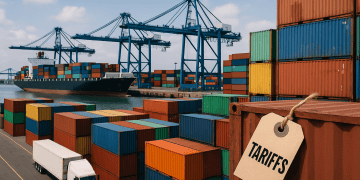President Donald Trump’s latest round of country-specific tariffs, added to existing trade levies, is expected to significantly increase the cost of imports for U.S. businesses. Some countries, excluding China, will receive a 90-day delay in the implementation of tariffs, President Trump announced Wednesday.
The tariff increases, particularly for goods imported from China, have raised concerns among businesses of all sizes. Rick Muskat, president of Deer Stags, a family-owned shoe retailer that imports from China, indicated that the new tariffs could raise costs for his company from $60,000 to up to $1 million on current freight orders. Deer Stags, which sells men’s and boys’ shoes through retailers like Macy’s and Kohl’s, has already seen prices increase on its products as tariffs rise.
Before the tariff hikes in 2025, Deer Stags faced a 6% duty on its goods. This duty has now escalated to over 100% for certain products. Muskat stated that while his company plans to pay the increased costs, smaller businesses may struggle to manage the added financial burden, possibly leading to freight being abandoned at ports.
When companies are unable to pay for the tariffs on goods arriving at U.S. ports, they may choose not to accept the freight. This could result in the goods either being returned to the manufacturer or auctioned off or destroyed in the U.S. Some businesses are already delaying shipments or instructing factories to pause production until the full impact of the tariffs becomes clearer.
Joseph Esteves, CEO of Maine Pointe, a global supply chain consulting firm, noted that many businesses are hesitant to accept shipments due to the lack of working capital to handle the higher costs. He explained that many companies do not have the liquidity to absorb these changes, especially in light of slowing consumer demand.
The new tariffs will primarily affect goods from China, which make up a significant portion of U.S. imports. However, according to U.S. Customs, goods already in transit will not be subject to the new tariffs if they arrive before May 27. This provides some temporary relief to businesses already dealing with the financial strain of rising tariffs.
Manufacturers and importers face further challenges as shifting supply chains away from China may not be a quick solution. Bruce Kaminstein, a former CEO of Casabella and an angel investor, emphasized that it takes years to establish manufacturing supply chains, particularly for smaller businesses. While some companies are exploring options to diversify their supply sources, there are limited manufacturing options within the U.S.
The Small Business Administration (SBA) expressed support for the administration’s trade policies, arguing that the efforts would ultimately benefit U.S. businesses by creating a more level playing field. However, some industry experts warn that the high tariffs could lead to increased prices for consumers, particularly for everyday items like clothing and imported goods such as coffee and bananas.
Retailers, who are facing these new costs, may not be able to absorb all of the price increases. As tariffs approach rates of 50% or higher, some businesses will likely pass on these higher costs to consumers. The National Retail Federation called for quick negotiations with affected countries to help mitigate the impact of the new trade policies.
As the situation continues to evolve, businesses are keeping a close watch on how tariffs will affect both their operations and consumer prices.
Get the latest supply chain report news at The Supply Chain Report. Learn more about international trade with tools from ADAMftd.com.
#USTariffs #FreightAbandonment #PortOperations #TradeTariffs #SupplyChainCosts #USPorts #BusinessImpact
















